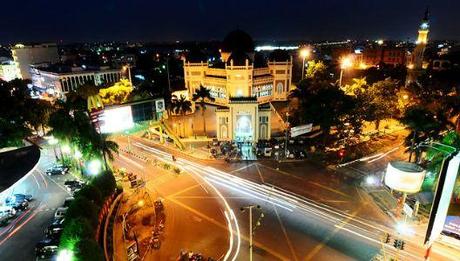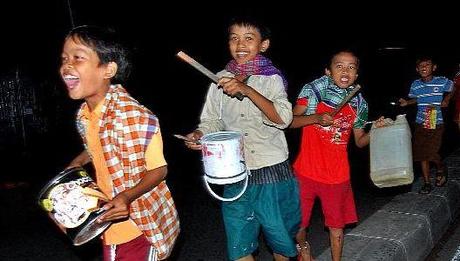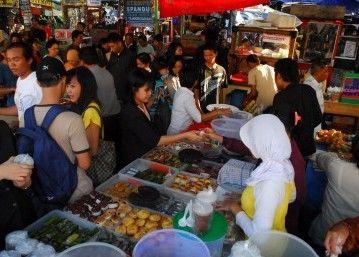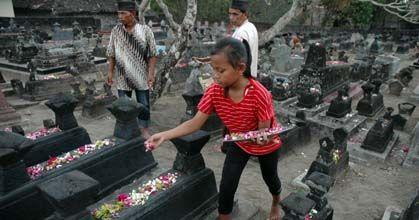
In Indonesia, one of the most populous Muslim countries in the World, Ramadan has become the most celebrated and awaited month of the year. When Ramadan approaches, Indonesia suddenly turns into a state of festivity. Two weeks before Ramadan, all TV channels have subject specialist programmes related to Ramadan. What is more, during the month TV channels are filled up with Ramadan-related advertisements. Shopping centres in metropolitan cities such as Jakarta are ready to give their best discounts for people looking for new clothes to celebrate Eid al-Fitr in.
By Hadza Min Fadhli Robby
It’s getting more and more exuberant when Ramadan approaches in Indonesia; starting from the first night of the month, mosques that are usually empty are now crowded with enthusiastic people that eagerly welcome this blessed month. Moreover, all are determined to seek repentance from God.
How does fasting affect daily life in Indonesia?
In Indonesia the fasting period lasts from 4 am to 6 pm (around fourteen hours). However, this depends on where you live as Indonesia is a large country which spreads over three time zones! These range from UTC +7 to UTC+ 9.

Wake-up call tradition (courtesy: pasarkreasi.net)
Activities usually start at 3 am when people wake up for suhoor (pre-dawn meal). However, mothers and house-maids are usually awake at 2 am to prepare the meal for suhoor. Followed by the high pitched message from Masjid’s for followers to “prepare for suhoor!” Thus unleashing a vibrant pre-dawn ambience. This “waking people up” tradition is also performed by youngsters that walk around villages using percussion instruments to wake people up for suhoor. I admit, sometimes it is noisy and annoying, but on the whole I enjoy this unique tradition.
As people get really lazy and tired before/during the pre-dawn meal, Indonesian television channels play comedy shows full of jokes and slapstick humour so as to liven up people’s moods and spirits. However, nowadays, these same shows are being criticised as they lack morals. Ramadan is supposed to give people moral enlightenment hence shows like these must be re-evaluated. Some shows now include segments from preachers (ustad’s) sermon’s so as to make them more moral. Despite these changes, multiple comedy shows have chosen to retain these meaningless jokes and numerous people still choose to watch them, forgetting that the purpose is merely to wake people up.
Pre-dawn meal ends when the Imsak (the time the fast begins before Fajr prayer) time begins. Imsak usually begins fifteen minutes before the athaan (prayer call) is given as a stark announcement to pray from the Mosque.
Life resumes as normal one or two hours after Subuh (nautical twilight for Fajr prayer), some stay awake and some rest before beginning their daily activities such as going to work, going to school/university, shopping in markets and centres etc. The pace of life does however become slower in Ramadan and business often condense business hours from the traditional 8 hours to 6. In this manner, people have more time to get closer to God i.e. by offering more prayers and by reading the Qu’ran.

Street vendors publicising different food stuffs in Bendungan Hilir, Jakarta (courtesy: Republika)
By the time the afternoon arrives, people are getting ready to go back to work or are busy contemplating where to eat for iftar (breaking of the fast). It’s easy to find plenty of meals during Ramadan. Street vendors are filling up markets, Mosques, and fields, offering various types of delicacy from snacks to heavy meals for iftar. Usually people shop in these markets to buy snacks for their household for iftar, save for some who prefer to eat their snacks at the Mosque and share it with fellow Mosque goers.
The thirst is finally quenched when the athaan for Maghrib is announced. In many houses, families prepare a large selection of food for iftar, some food is bought from the market and some are home-made. These meals never get finished; instead the leftovers are used and re-heated for suhoor. After the Magrib prayer is completed, people prepare to go to local Mosques to attend Isha’ and Tarawih prayers. After the Isha’ and Tarawih prayer is completed, people return home and read some of their Quran before sleeping.
That’s the usual pattern for Indonesians during Ramadan.
Unique Traditions
Owing to the fact that Indonesia is culturally-rich it even has several unique traditions related to Ramadan!

Nyekar tradition in Muslim cemetery (courtesy: antaranews)
Prior to Ramadan, people visit their late family’s graves to pay their respects and share their thoughts. Indonesians call this tradition ‘nyekar’ or ‘flower giving’. To welcome Ramadan, people dress their family’s graves with beautiful flowers and scents as they believe the souls of the departed will be in high spirits hence returning back to them in Ramadan. Besides giving flowers, people also offer prayers for their souls so that they may be forgiven by Allah. Although ‘Nyekar’ tradition originates from Hinduism, Muslims in Indonesia still practice it until this day.
During Ramadan, there’s certainly some interesting phenomenon to observe. Being a multicultural country, Indonesia is known for its religious tolerance. This religious tolerance is portrayed in the actions of several non-Muslim organisations who give iftar and alms to the poor and needy. In Bojonegoro (a town in Central Java), a Buddhist temple is renowned for frequently giving free iftar meals to Muslims since six years.
On the other hand, multiculturalism may be quite challenging for non-Muslims (antithesis of the situation European Muslims face), especially Christians who make the largest religious minority group in the country. During Ramadan, they have to cater their food habits around Islamic timing as many food places shut for business until the afternoon. Hence, in order to find food they have to either adapt to Islamic timings or spend time searching for restaurants which cater for non-Muslims. On the most part, many of them manage to respect their fellow Muslim neighbours.
Another thing which has made Ramadan 2011 extra special is the fact that the Indonesian Independence Day fell on the same day of the Nuzul-al-Quran (revelation of the Qu’ran), 17th August. People predict this is a good sign for hopefully a more blessed Indonesia.

Overcrowded car during mudik tradition in Merak Harbor (courtesy: vivanews.com)
As Ramadan slowly draws to an end, people partake in the annual tradition which is a type of massive migration towards their homeland, Indonesians refer to this as mudik. For Indonesian people, mudik is an important moment of the year when people visit their families and relatives to strengthen their familial bonds (silaturahmi). People usually get excited during the last week of Ramadan; offices start closing for holiday, migration en masse begins whether this is by land, sea and air, all leaving their city life behind to visit their modest villages. As you can see, during this time the streets and roads are packed by cars and buses.
There are still eleven days of Ramadan left and the festivities have not ended in Indonesia yet. Hopefully all of us can gain His mercy and blessings during the final ten days of this month.
So in honour of the last ten days, Salam Ramadan dari Indonesia! (Ramadan Mubarak from Indonesia!)
*Hadza Min Fadhli Robby is an undergraduate student of Universitas Gadjah Mada, currently on 3rd semester, majoring in International Relations


